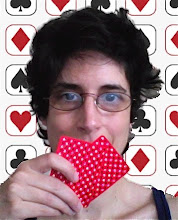The Joy of Poker
Those of you following along on my tweets already know the outcome of my trip last weekend to Atlantic City: a big steaming pile of break-even.
And you know what? That's just fine with me.
I had a little mini-revelation on this outing. Despite my decision to let go of the pro-poker dream, I was still playing as if my livelihood depended on it. Now, generally, one might think was a good thing. Discipline, etc. And that's undoubtedly true.
But playing professionally is also notoriously a grind. It's especially a grind when things have not been going one's way for a protracted period of time: the bad results are depressing, and bad results often lead to bad play, which leads to more bad results. It's the most vicious of vicious cycles.
My first day was a downer. Lose lose lose lose. Bleah. No fun. Lots of folding, discipline aplenty, then one dubious decision and buh-bye stack. At day's end, I vowed to myself that I would play my A game in the Circuit tournament. My one and only goal was regret-free poker.
And I did. I played for six hours without making a single error. I watched glumly as the correct folds I made would have turned into table-stacking monsters, but I made the right choices. I was colossally card-dead most of the time, and was presented with very few viable stealing opportunities. More than six hours in, I still had a starting stack, and it was shove-or-fold time. I won a few blinds and antes. I folded KJo to a raise and re-raise in front of me and missed the flopped boat (d'oh!). I finally shoved with pocket 8s and lost to AK behind me.
I was now $700 in the hole for the trip. But I was feeling pretty good about the way I'd played in the tournament, and I wasn't especially tired. I decided that, since I was unlikely to be back in AC in the near future, I might as well mix it up in the cash games again and this time try to actually enjoy it. I took $1000 to the table and promised myself that I was going to play well and have fun: no scared money here, no ubernitiness. I brought out my cheerful, social persona. I was going to have a good time no matter how the cards fell.
And I did, oh yes I did.
My hand selection criterion became: will I have fun playing this hand (in this position, for these stakes, against these players)? My folding, calling, betting, or raising criterion: which action will be most fun?
And because I consider winning money more fun than losing, this didn't change my gameplay a great deal. What it did change was my attitude.
I proceeded to play for six more hours, during which time I completely recouped my loss and made a few bucks to boot. I began to remember why I got hooked on poker in the first place. I rediscovered my inner recreational player.
So that's me, now: I'm a recreational player, and that's okay. In fact, I like it! A great psychological weight has been lifted. My little hobby more than pays for itself, plus I get free hotel rooms and food too. And I now have license to play JUST FOR THE SHEER FUN OF IT. Wheeeeee!
Labels: Atlantic City, cash game, strategy, tournament
